Chairing a discussion on the controversial Hungarian Zionist Rudolf Kasztner at London's Jewish Book Week on February 27th, Prof. David Cesarani remarked that the history of the 'Holocaust' as it affected Hungary's Jewish community is "shot through with ambiguity".
This ambiguity emerged not only in the content of the debate, but in the conduct of its organisers. The chairman of Jewish Book Week, Gail Sandler, kindly ensured our entry to the meeting despite our last minute arrival. But at the end of the event, Lady Renouf was approached by an official of the Community Security Trust, who said "Michèle, we let you in this time, but we have spoken to the organisers and you are not welcome at any more of these events." Surprised that the CST even knew who she was, and even more surprised to be banned given that she had not said a word during the meeting, Lady Renouf asked to be given some reason for her exclusion.
She was told that Jewish Book Week was a private event and that the organisers had the right to ban anyone they wished; the CST official said he would put the reasons in writing, adding the sinister threat: "we know the address to write to." This extraordinary proscription would seem to contradict JBW's own mission statement: Jewish Book Week is a multifaceted international festival unallied to any religious or political denomination.
More importantly it raises serious questions about JBW's Arts Council sponsorship, since the Arts Council of England is keen to stress its commitment to a positive celebration of diversity and the artistic and creative opportunities it offers, and aims to dismantle social or institutional barriers that prevent people from participating in and enjoying the arts - with particular reference of course to issues around race, ethnicity and faith.
Since there were no problems during the meeting, and Lady Renouf had not intervened in the debate or caused any conceivable offence to anyone on the platform or in the audience, it seems odd that the Arts Council funded Jewish Book Week seems determined to erect political/ethnic/religious barriers rather than dismantle them!
After his attention was drawn to Jewish Book Week's inappropriate conduct the Chief Executive of the Arts Council, Alan Davey, wrote to the organisers to reprimand them for their discriminatory behaviour, stressing that "an event that is open to the public must allow access to all audience members regardless of their political views."
In other words the Jewish Book Week and the Community Security Trust may wish to exclude their political opponents from such events, but if they wish to continue receiving public funds they do not have the right to do so.
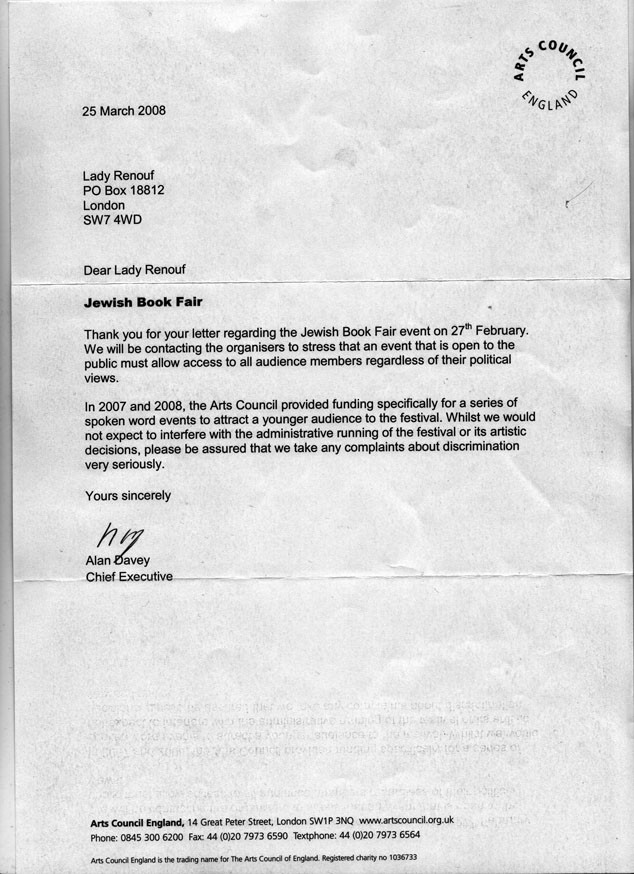
Perhaps the CST was worried about any report we might publish about the content of the debate, which as one might guess from its title - Rehabilitating Kasztner - was in its way a form of Holocaust revisionism. While some revisionists are imprisoned, others are given a platform at Jewish Book Week...
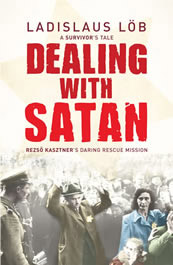
German courts continue to imprison lawyers and scholars for daring to challenge the legally protected "manifest obviousness" of the approved version of 'Holocaust' history. Yet Prof. Cesarani opened the JBW debate by saying that there was "nothing clear cut" about the history of Hungarian Jewry in 1944-45 - swiftly adding "except of course the fate of the 430,000 deported to Auschwitz".
Kasztner's story begins with the German occupation of Hungary on March 19th 1944. Cesarani and his fellow academic Ladislaus Lob (author of the new book Dealing with Satan, Rezso’s Kasztner’s Daring Rescue Mission) agreed that this occupation aimed first to prevent Hungary's potential defection to the Allies, and second to exploit the country's resources fully in a last ditch effort to avert defeat.
Part of this objective was, in Cesarani's words, to "get their hands on Jewish labour", and he pointed out that the deportation of Hungarian Jews was made possible in the first place by an agreement between Adolf Hitler, Joachim Ribbentrop and Hungarian regent Admiral Horthy to deliver 100,000 workers to Germany.
This prompted a naive interruption from Kasztner's daughter Zsuzsi, who objected that as far as she knew Eichmann had deported and killed 450,000 Hungarian Jews - so how did labour come into the equation?!?
An embarrassed Cesarani had to point out that there was a "bizarre core of rationality" to the deportations, and that on his own estimate around 20% of the Jewish deportees were selected for various forms of work.
The main ambiguity concerns the Jewish - and more specifically the Zionist - reactions to these deportations. Prof. Lob recalled that he and his family were detained with other Jews at a brick factory in April 1944. A modern reader might well ask: did Jews believe that they were heading to the now notorious alleged industrial murder showers in the 'gas chambers'? And if so, why did they not resist or flee, knowing that they had nothing to lose?
Far from resisting or fleeing, the leaders of a Zionist "relief and rescue committee" in Hungary, Rudolf Kasztner and Joel Brand, persistently negotiated and cooperated with the German occupiers, the same demonic oppressors who we are now told were engaged in the systematic homicidal extermination of European Jewry by mass gassing.
Brand - described by Prof. Lob as a "smuggler and black marketeer" - was sent as a German emissary to Istanbul to begin some sort of negotiation with the Allies. Prof. Lob stated that the precise objective of Brand's mission is still a mystery. Did Heinrich Himmler see that the war was lost and hope to improve his personal reputation, or was there some attempt even at this late stage to drive a wedge between the Western Allies and Stalin's Russia?
Prof. Lob might benefit from David Irving's research into the Joel Brand mission, some of which is available online here. (Irving's incarceration in Austria during 2006 resulted from his visit to that country to lecture on Brand and Kasztner.)
Soon after his arrival in May 1944 Brand was detained by suspicious anti-Zionists among the British authorities. One of the British officials most hostile to Brand was Lord Moyne, the British Minister in Cairo, who was assassinated by Jewish terrorists a few weeks later. Moyne's allies had leaked details of the Brand mission, which included a German proposal to release a million Jews in return for trucks and pharmaceuticals, to the BBC, which described the proposals as "humanitarian blackmail", and The Times, which described this as one of the "most loathsome" stories of the entire war.
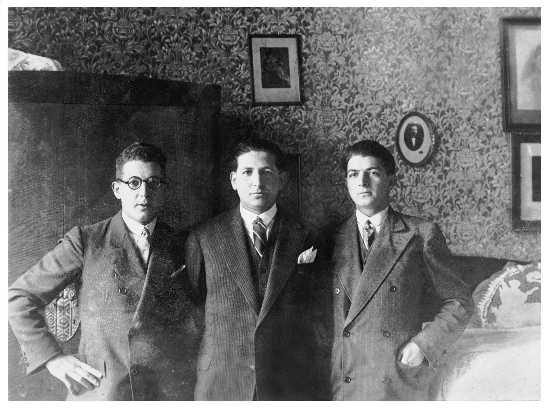
Rudolf Kasztner (right, with his brothers) was only interested in 'rescuing'
those Jews useful to the Zionist project
Brand's removal left Kasztner as the effective leader of the relief and rescue committee, known by its Hebrew title Va'ada and he negotiated the release of around 1,700 of his fellow Hungarian Zionists. Prof Lob revealed that about 150 rich Jews paid the entire cost of $1,000 per head.
Zsuzsi Kasztner told the meeting that only about 2% of Hungarian Jews supported the Zionists, so it is not surprising that many historians - some of them Jews - have concluded that her father was only interested in rescuing Zionists, and that the short term interests of the Nazis and the long term interests of the Zionists effectively ran in parallel during 1944.
Needless to say, this is a controversial topic and one which the speakers only touched on indirectly. They admitted that Kasztner and the Va'ada sent teenage Zionist activists around Hungary to rally support among exactly the type of dynamic young Jews who would be needed to build a new Jewish state in Palestine. As later became clear to British forces trying to defend Palestine from waves of illegal Jewish immigration, the Zionists were mainly interested in transporting Jews of child bearing age who could populate and defend the new Israel.
With German cooperation, the 1,700 Jews on the Kasztner train were effectively rescued twice, first from Hungary and then from Bergen-Belsen, which at first was regarded as a transit camp for privileged Jews, until amid the chaos of the war's final months overcrowding and chaotic administration led to a typhus epidemic. Kasztner's Zionists had left Bergen-Belsen by then, in two trainloads to neutral Switzerland in August and November 1944.
Adolf Eichmann, in a 1960 interview with Life magazine, clearly recognised the common interest between Nazism and Zionism, though he could not have foreseen its tragic long term consequences:
This Dr Kasztner was a young man about my age, an ice-cold lawyer and a fanatical Zionist... We negotiated entirely as equals. People forget that. We were political opponents trying to arrive at a settlement and we trusted each other perfectly. With his great polish and reserve, he would have made an ideal Gestapo officer himself. As a matter of fact, there was a strong similarity between attitudes in the SS and the viewpoint of these immensely idealistic Zionist leaders, who were fighting what might be their last battle. As I told Kasztner: 'We too are idealists, and we too had to sacrifice our own blood before we came to power.' I believe that Kasztner would have sacrificed a thousand or a hundred thousand... to achieve his goal.
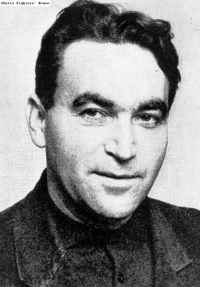
Rudolf Vrba - the ultimate ambiguous witness
Rudolf Vrba, an Auschwitz witness who is usually treated with reverance by orthodox historians, consistently argued that Kasztner had betrayed the vast majority of Hungary's Jews:
It is my contention that a small group of informed people, by their silence, deprived others of the possibility or privilege of making their own decisions in the face of mortal danger.
At the JBW meeting Prof. Lob implied that Vrba was not a witness to be relied on, a suggestion that in another context would earn him a jail sentence in Germany, Austria or several other European countries (even though Vrba once admitted in the Canadian trial of Ernst Zündel that his Auschwitz memoirs contained "poetic license".)
By contrast two anti-Zionist British academics, Hilary and Steven Rose, wrote in the Guardian following Vrba's death:
Rudi's mission, once he had escaped from Auschwitz, was to warn the surviving Jewish community of Budapest of the impending deportations, but he had not anticipated the collusion between sections of the Zionist leadership and the Nazis, especially their senior Budapest administrator, Adolph Eichmann, which ensured that nothing was to disturb the orderly deportation of some 400,000 of the Jewish population, while sparing many of the leaders, notably Rudolph Kastner, who survived to emigrate to the nascent Israeli state. The details of these secret dealings were published in Israel by Malkhiel Gruenevald, and in 1954-55 Kastner sued Gruenevald for libel. He lost, although the judgment was reversed on appeal. Vrba's accounts of his experiences, as in the Eichmann trial of 1961, were vital to exposing this collaborationist network.
So, as he told us, when he escaped from Prague for Israel, and found some of the same Zionist leaders in positions of power who had helped betray the Jews of Budapest, he left for England, and later for the tranquillity of Vancouver.
Most shocking to Kasztner's fellow Jews, in the immediate post-war years and perhaps still today, was his close working relationship - even friendship - with Eichmann's associate, SS officer Kurt Becher, who was appointed by Himmler during the final months of the war as Special Reich Commissioner for all concentration camps.
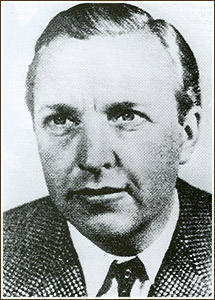
Senior SS officer Kurt Becher
Kasztner later testified to save Becher from a prison sentence. During the mid-1950s controversy erupted in Israel when Kasztner unsuccessfully sued one of his critics. He was especially embarrassed when he attempted to deny having testified on Becher's behalf. Judge Benjamin Halevi rejected Kasztner's case in damning terms:
The Nazi’s patronage of Kastner, and their agreement to let him save six hundred prominent Jews, were part of the plan to exterminate the Jews. Kastner was given a chance to add a few more to that number. The bait attracted him. The opportunity of rescuing prominent people appealed to him greatly. He considered the rescue of the most important Jews as a great personal success and a success for Zionism. It was a success that would also justify his conduct - his political negotiation with Nazis and the Nazi patronage of his committee. When Kastner received this present from the Nazis, Kastner sold his soul to the German Satan...
On March 3rd 1957 Kasztner was shot dead by a militant Jewish group outside his Tel Aviv home. Jewish author Ben Hecht later wrote:
Some blamed right-wing fanatics and others believed that Israeli intelligence had Kastner killed for fear of what he might reveal about contacts between the Nazis and the Israeli government during the time of the Holocaust.
(Hecht's 1961 book about the Kasztner affair, Perfidy, was for many years difficult to obtain, but the complete text can now be downloaded here.)
Ze'ev Eckstein, Kasztner's assassin, turned out to have been a paid informant for Shin Bet, the Israeli security service. The murder gang served remarkably light prison sentences and were all released by 1963. There has been speculation ever since that Kasztner had to be dead before the Israeli state could proceed with its kidnapping, trial and execution of Adolf Eichmann, a seminal event in the creation of the modern Holocaustianity myth.
Unsurprisingly the whole Kasztner affair is regarded as a continuing discredit to Zionism, so much so that the Daily Telegraph's reviewer incorrectly though understandbly assumed that Kasztner rather than Eichmann was the 'Satan' referred to in the title of Prof. Lob's new book Dealing With Satan - as though a Zionist Satan had done a deal with Eichmann! Though Cesarani, Lob and Zsuzsi Kastner did touch on several issues traditionally regarded as unmentionable, some aspects of the Zionist omerta remained inviolate. They agreed not to comment on the controversy over three Jewish parachutists who arrived in Hungary in 1944 as part of a British initiative to establish a guerrilla resistance force, but were cold shouldered by Kasztner and handed over to the Germans. Cesarani seemed happy to allow a consensus that in failing to alert his fellow Jews Kasztner had merely "tried not to communicate panic" - an odd objective one might think if he were aware that they were being lined up for mass gassing.

Jim Allen, author of the banned play Perdition
In particular, Cesarani studiously avoided any reference to Jim Allen's play Perdition, or the work of Jewish historian Lenni Brenner. Perdition was a fictionalisation of some aspects of the Kasztner libel trial, which attempted for the first time to draw the attention of a British audience to the disgraceful origins of Zionism and hinted at the unmentionable truth - that the very term Holocaust effectively refers to the sacrifice of non-Zionist Jews to ensure the fulfilment of the Zionist project and an everlasting alibi for the actions of the Zionist state.
This was especially dishonest given that Cesarani himself was central to the campaign against the play, which led to its virtual suppression. He wrote a report for the Royal Court damning it as anti-semitic, which led to the theatre pulling out of a proposed production.
Twenty years later, when the Scottish Palestine Solidarity Campaign presented performances of the banned play, Lenni Brenner (author of Zionism in the Age of the Dictators) challenged Cesarani to:
debate the factual merits of Perdition and the larger question of Zionist/Nazi relations.
Unsurprisingly, Cesarani failed to reply and no such debate took place.
The broader issues raised by the Kasztner affair remain unexplored, principally - did Zionists exploit Nazi policy towards to Jews as part of their project to colonise Palestine, and did German willingness to cooperate with Zionists indicate that the objective of Hitler's policy all along was not the mass murder of Europe's Jews but their resettlement, whether in Madagascar, Palestine or remote regions of Russia?
These are of course the questions which cannot be asked by Europe's embattled revisionists. Judging from the reactions of the Community Security Trust during London's Jewish Book Week, to risk the mere potential of such inquiry is unwelcome even in those parts of Europe which (so far) remain free from anti-revisionist laws.
British taxpayers are left wondering why the Arts Council of England should be using their funds to sponsor Jewish Book Week, whose organisers have singled out for persecution a blameless member of the audience attending a public event?

Jewish Book Week proudly proclaims its Arts Council sponsorship - is this appropriate if the event is to vet its audience on political grounds
UPDATE - 29/2/08:
After bring confronted by the Community Security Trust at the Jewish Book Week discussion of Rudolf Kasztner, Lady Renouf was targetted by a press photographer, whose focus had also been evident during the meeting, yet the following week's Jewish Chronicle (February 29th) avoids all mention of the incident. In fact the JC's report on Jewish Book Week cuts out all mention of the Kasztner event.
No doubt this is partly because the JC's readership does not like to be reminded of the Kasztner controversy, but the paper may also have considered that boasting about political vetting of the audience at Jewish Book Week might undermine the impact of one of their other stories that week.
Under the headline Muslim academic calls for book-fair boycott the JC singled out Professor Tariq Ramadan, senior research fellow at St Antony's College, Oxford, for his criticism of the Turin and Paris book fairs, which made Israel "guest of honour" in recognition of its 60th anniversary.
Prof. Ramadan said:
...All women and men of conscience ...should boycott the Turin Book Fair (as well as the Foire du Livre de Paris) when the guest of honour is a country that refuses to respect the rights and the dignity of peoples.
He went on to explain that his boycott call
is not an attempt to prevent Israeli authors from attending or expressing themselves. It does not refuse to engage them in debate.
Yet this entirely rational position, and Prof. Ramadan's acknowledged status as a scholar who has consistently called for dialogue between Muslims and Jews, did not spare him the wrath of the Zionist lobby. Ronnie Fraser, director of Academic Friends of Israel, said:
If you boycott events, you don't have dialogue.
To which one could reply - if you exclude people from book fairs whose views you don't like, you have neither dialogue nor a right to public funding. At least the JC recognised the inherent inconsistency of the Zionist lobby's position in this respect, and refrained from boasting about the JBW/CST edict. Yet one small irony remained. Directly below the Tariq Ramadan story, the paper carried an advertisement soliciting funds for the Community Security Trust!
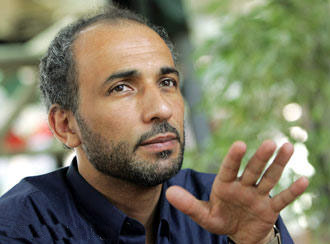
Prof. Tariq Ramadan
The treatment of Prof. Tariq Ramadan by the Zionist lobby and its allies is a textbook case of the method of demonising Israel's critics through allegations of "anti-semitism" and collusion with "terrorism". Prof. Ramadan was listed by Time magazine as one of the 100 "innovators ...who shape our world". He was appointed as an adviser to the British government. Yet he is banned from entering the United States under the "Patriot Act" and has been condemned by the Socialist Mayor of Paris for "anti-semitism".
As Prof. Ramadan wrote in the Washington Post in 2006:
My experience reveals how U.S. authorities seek to suppress dissenting voices and -- by excluding people such as me from their country -- manipulate political debate in America. Unfortunately, the U.S. government's paranoia has evolved far beyond a fear of particular individuals and taken on a much more insidious form: the fear of ideas.
This fear of ideas is evident worldwide wherever modern Zionism and its allies are found, from the U.S. State Department to the Jewish Book Week to the Mannheim District Court. Americans and Europeans should be asking themselves - what lies behind this fear of ideas? What have our political and academic leaders got to hide from those scholars or publishers who aim to focus the spotlight of free research onto what even Prof. Cesarani regards as the ambiguities of 20th century history?